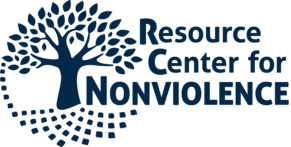In a moment of historic ethnic studies expansion in the state of California, why is it important to return to the political origins of the field? In a conversation led by Silvia Morales, Executive Director of the Resource Center for Nonviolence (RCNV), Professor Christine Hong, the Director of the Center for Racial Justice (CRJ) at UC Santa Cruz, shed light on the urgency behind the “Revisiting the Third World Roots of Ethnic Studies” workshop.
Silvia kicked off the interview, asking Christine about the motivation behind this workshop. Pointing to California’s Assembly Bill 101 as a key impetus, Christine noted that ethnic studies, as a field, signaled a grassroots intervention in a system of education that was designed to reproduce a society structured in dominance. As teachers and community organizers, she stated, “We all have a responsibility to ensure that the curriculum mandated by AB101 reflects the larger community.” Christine emphasized the collective responsibility in ensuring that the educational landscape both reflect and be accountable to Indigenous communities and communities of color, groups historically marginalized in traditional curricula.
Delving into the significance of revisiting the roots of ethnic studies, Christine challenges the misconception that ethnic studies is solely about ethnicity and race, or even understandable as “ethnicity studies.” People misconstrue ethnic studies to be an arena where you learn about ethnicity and race in ways “that reify or re-confirm the solidity of those categories,” she stated, when in fact immersion in the field “demonstrat[es] that the process of racialization is a process of power.” Returning to the Third Worldist roots of the field allows us to understand ethnic studies as anti-imperialist in its commitments, she pointed out.
Highlighting the responsibility educators bear in teaching ethnic studies, Silvia emphasized that poorly executed attempts can be more damaging than not doing it at all. As she noted, few students of color or Indigenous students see themselves in their education materials, which enshrine a worldview that negatively affirms for them their lack of place, value, or impact. Pointing to the anticolonial theorist Frantz Fanon’s description of the purpose of education in imperialist countries as bewilderment, Christine concurred, stating, “Ethnic studies isn’t just about content; it’s a method, a pedagogy, a way of transforming community, and teaching critical analysis.”
Yet doing ethnic studies is not without risk. Conservative and reactionary groups, often the same ones that have attacked “critical race theory,” have also placed ethnic studies in their crosshairs. Observing that ethnic studies poses a challenge to structures of power, the two women discussed how ethnic studies can reproduce itself. Collaboration among teachers, community organizers, and students is the bedrock of the field. Having organized for almost a decade and a half for ethnic studies at UCSC, Christine shared that she, too, had come under attack for her advocacy work and that the purpose of the attack is to isolate and to instill fear. Recognizing these challenges, she underscored the importance of intentional spaces of community and care for educators engaged in this brave work.
In response to Silvia’s question on real-world applications and impacts of ethnic studies, Christine drew a powerful connection to student activists from the Third World Liberation Front at Bay Area universities in the late 1960s. Noting that some of them came from migrant farmworking families in Salinas and Watsonville, she emphasized that they rejected a notion of education as an escape hatch into individual success. Instead, they viewed education as an opportunity to serve their communities. Many went on to be part of the historic I-Hotel struggle in San Francisco, and from that struggle, they seeded the field of education, created community health clinics and other mutual aid infrastructure, became culture workers, and earned their chops as organizers.
Ultimately, Christine, alongside other UCSC faculty, local high school teachers, community organizers and activists, and students, envisions retelling the story of Santa Cruz away from its dominant image of “sun, surf, sustainable farming, and redwoods” and diving into what goes untold in terms of local histories. Silvia emphasized the importance of examining what is missing in the archives, particularly in representing those who have been historically marginalized.
The interview concluded with Silvia exploring the dynamics of white fragility, “a lifelong unlearning and understanding of how to be comfortable with being decentralized, and lifting others up. That is probably more challenging than learning the material.” Morales spoke on the challenge of dismantling ingrained societal structures.
In this intellectually-stimulating exchange, Christine Hong and Silvia Morales offer profound insights into the critical role of ethnic studies in reshaping education and fostering a more inclusive and equitable society.
Readers can catch a glimpse of the workshop’s essence and join the dialogue even if unable to attend, as the RCNV continues to be a guiding force within the greater Santa Cruz area in the expansion of ethnic studies, embodying the principles of a beloved community.

